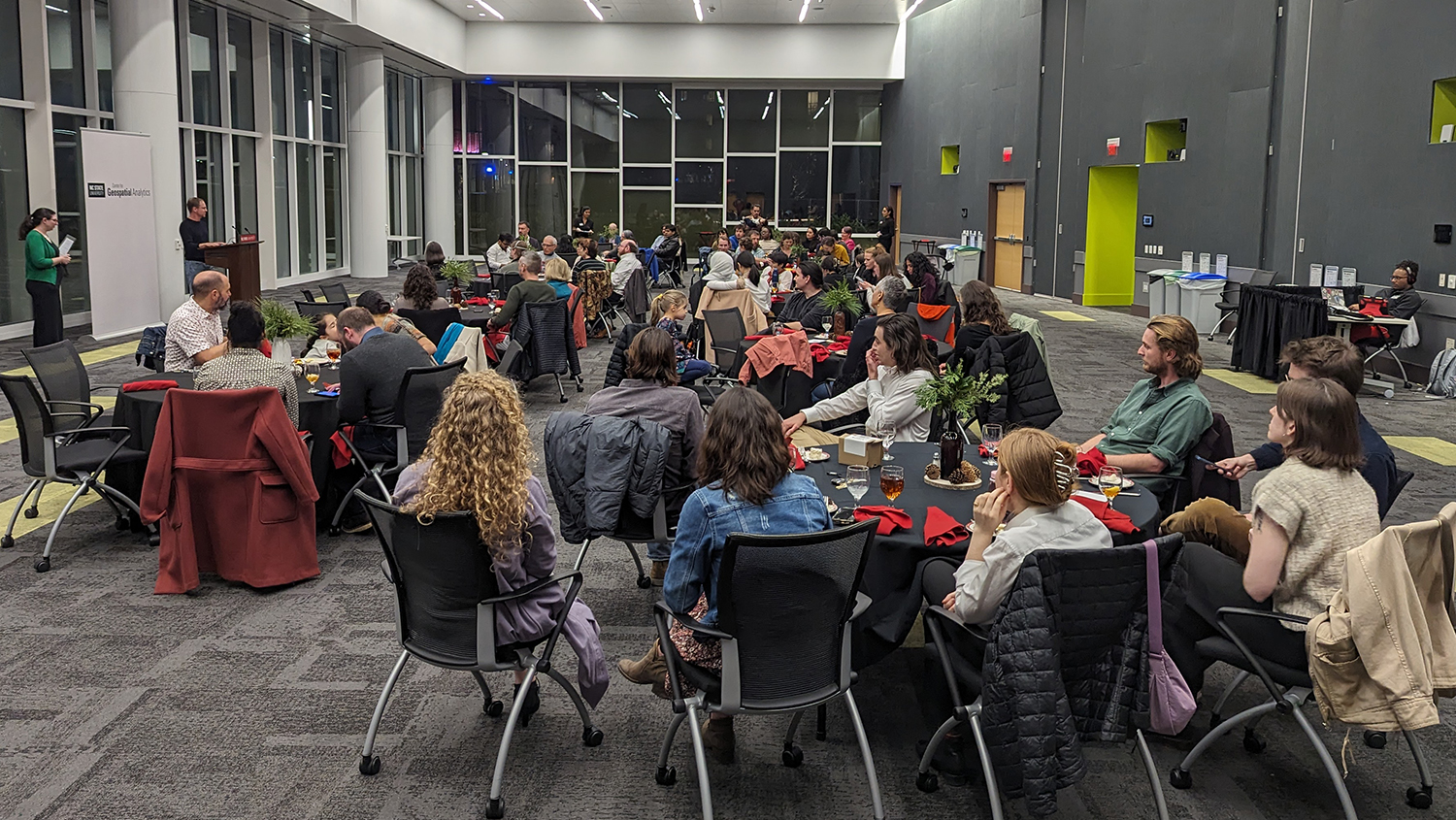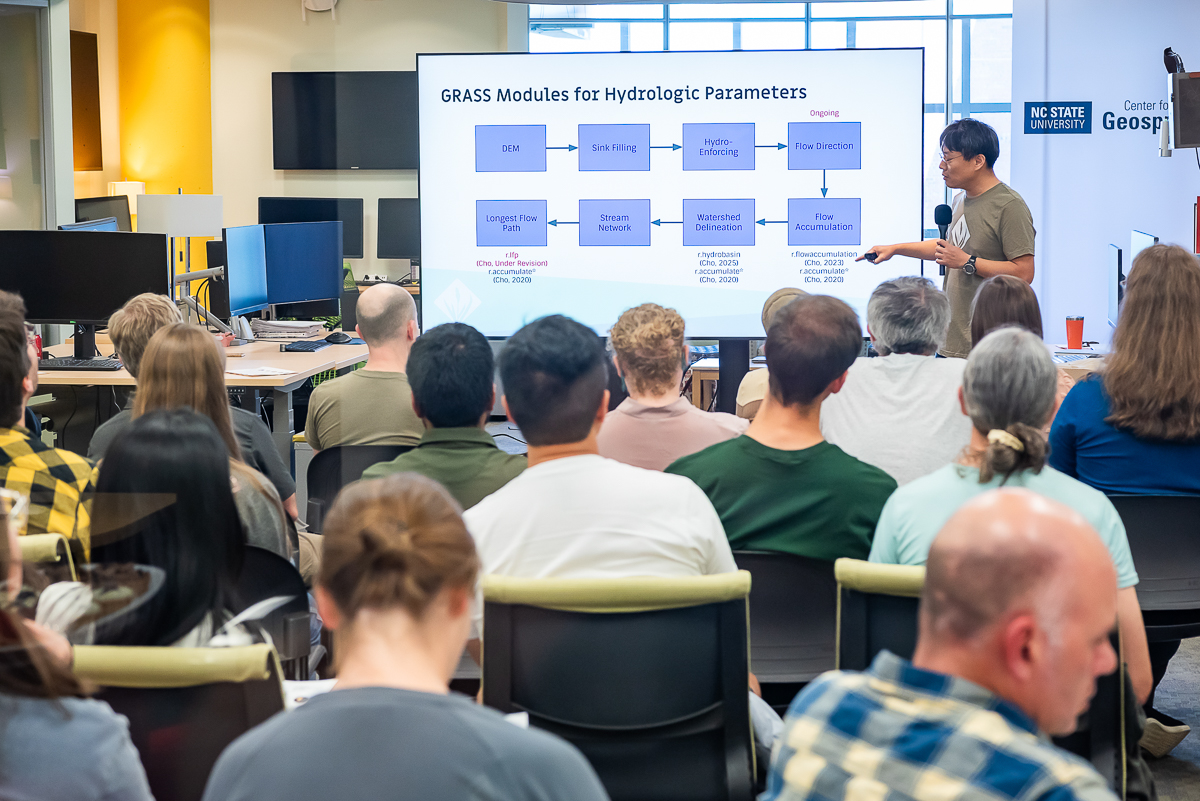On February 5, the Center for Geospatial Analytics celebrated its fifth Awards Ceremony, honoring 2023 achievements by our exceptional students, faculty and staff. Check out the event program and photo gallery!
At the awards dinner held at NC State University, the fifth round of CGA Awards were presented. These awards, established in 2019, honor members of the Center for Geospatial Analytics community whose efforts exemplify Center ideals of collaboration, inclusion and excellence in research, teaching and service. Center students and faculty/staff were nominated by other Center members for the awards, and winners were selected by the Awards Committee.
Advocate Award
Given to one student and one employee who demonstrates a commitment to equity and inclusion.
- Student awardee: Deja Perkins, a third-year Geospatial Analytics Ph.D. student, who received multiple nominations for this award. There were many glowing statements made about Deja; here are a few:
- “On campus, she served as President of the Black Graduate Student Association and represented the group in campus-wide Graduate Student Association meetings.”
- She gave “a talk through…[the] TEDxNCState event in November about creating ‘your own table’ when you feel you don’t have a seat, co-created Black Birders Week to increase awareness for Black birders and the unique challenges they face in outdoor spaces, and leads free birding walks in Dix Park to help Raleigh residents connect to local nature.”
- “One of the more subtle things I’ve always noticed about Deja is that with every [Geospatial] Forum speaker and CGA event she makes a point to ask a question pertaining to equity or inclusion in that speaker’s research, which just goes to show how truly passionate she is about the subject in the broader STEM community.”
- “Deja mentors multiple undergraduate students at NC State working in a range of scientific fields. It is this type of near-peer mentorship that helps shape the future of science––by empowering students to feel prepared, supported and capable of pursuing careers in the sciences, especially if they are not the typical backgrounds or faces that populate academic faculty. This type of mentorship often goes unnoticed, so I applaud Deja for her work!”
- Employee awardee: Aaron Hipp, the Center’s Associate Director of Social and Behavioral Science Applications. Aaron is a fervent champion for the students in his lab, demonstrating unwavering support both on a personal and professional level. He goes the extra mile to maximize the impact of his grant funding, ensuring that it effectively benefits the students under his guidance. Moreover, Aaron actively provides opportunities for their professional development beyond the scope of CGA. His research exploring accessibility to parks and urban green spaces, particularly focusing on diverse populations, underscores his dedication to equity and inclusion.
Beacon Award
Given to one student and one employee who shines a light on the Center for Geospatial Analytics in the wider scientific community.
- Student awardee: Caitlin Haedrich, a fourth-year Geospatial Analytics Ph.D. student. In addition to publishing a first-author paper in Transactions in GIS in 2023, Caitlin has taken on a tremendous role in both organizing and leading GRASS workshops at NC State and beyond, as well as demonstrating Tangible Landscape to external stakeholders. Most recently, she presented her work on GRASS and Jupyter Notebooks at AGU and coordinated the Community Surface Dynamics Modeling System roadshow.
- Employee awardee: Karl Wegmann, an associate professor in the Department of Marine, Earth and Atmospheric Sciences and a Center faculty fellow. His nominator said: “I am nominating Karl Wegmann for the Beacon Award due to his large body of publications in 2023––he had six different publications affiliated with CGA! Some received press attention where CGA was also mentioned, including a feature on the website Universe Today. Karl was also recognized by NC State with an Outstanding Teacher Award this past spring. In addition, Karl has been a wonderful mentor to Raja Das, a Geospatial Analytics Ph.D. student, ensuring that he has the opportunity to compete for national recognition for his work (which he has received!).”
Collaboration & Innovation Award
Given to a research team who collaborates across disciplinary boundaries to address environmental and societal challenges.
- Team awardee: the GeoForAll GRASS GIS Team –– Helena Mitasova (Associate Director of Earth and Environmental Sciences Applications), Anna Petrasova (research software engineer), Vaclav Petras (research software engineer), Caitlin Haedrich (Geospatial Analytics Ph.D. student) and Corey White (postdoctoral scholar). Their nominator said: “I have never seen a lab group do more to engage with the larger scientific community than the group involved with GRASS GIS. This team has traveled all over the world, including the Czech Republic in 2023 and Italy in 2022, to advocate for open science and expand access to GRASS. This group was also instrumental in coordinating the visit from Dr. Verónica Andreo last spring. They have brought in multiple impressive grants, including a recent two-year, $1.5 million grant from the National Science Foundation (NSF) Pathways to Enable Open-Source Ecosystems (POSE) program.”
Creativity in Teaching Award
Given to one student and one faculty/staff member who creates an innovative learning environment that engages diverse learners in the study of geospatial data science.
- Student awardee: Rebecca Composto, a second-year Geospatial Analytics Ph.D. student. Her nominator said: “This year Rebecca has demonstrated her enthusiasm for teaching geospatial skills in several different realms. First, Rebecca assumed a prominent leadership role in GIS Week, leading sessions around cutting-edge technology for cloud GIS. Also this year, in collaboration with Dr. Money [Associate Director of Educational Innovation], she developed and delivered a middle school level two-day course on GIS Basics. Through this program, over 120 young students in Durham were exposed to the potential of GIS. Finally, Rebecca has also been serving as the graduate student representative on the CGA Education Committee, providing the student perspective to the committee decision-making process and communicating education updates to the CGA graduate student body.”
- Employee awardee: Bill Slocumb, a research associate and instructor who has been affiliated with the Center for many decades. He currently teaches the popular Web and Mobile GIS Protocols, GIS 535. His nominator said: “GIS 535 with Bill was not just a joy as a student but also as a TA. Bill knows what is up and coming at Esri and he shares that with the students. He crafts assignments that allow students to really dig their teeth into tools like Field Maps and StoryMaps. Bill’s positive feedback in weekly forums encourages students to explore intriguing topics and perspectives. As a TA, I witnessed non-MGIST students creatively applying these services, gaining a unique edge in their field.”
Interdisciplinary Advancement Award
Given to one student not enrolled in a Center degree program who applies principles of geospatial analysis to address grand challenges requiring an interdisciplinary approach.
- Awardee: Oliver Roper, a senior in Biological Sciences with a minor in Applied Ecology and a research assistant working with Faculty Fellow Elsa Youngsteadt. His nominator said: “Oliver Roper is an outstanding undergraduate researcher using methods from field ecology and geospatial analytics to understand urban habitat connectivity from a pollinator’s perspective. His work addresses the grand challenge of urban sustainability by deepening our understanding of how landscape structure affects bee foraging movements that are required for pollination. Oliver’s research goals are to determine which urban landscape features facilitate or impede bee movement. To assess bee movement, Oliver conducted a novel and challenging field study of five replicated landscape features (garden, lawn, forest, road and building). He found that buildings were the strongest barrier to movement, while lawns and forests facilitated it. Oliver then created a resistance raster by applying his field-documented movement probabilities to a high-resolution landcover map of Raleigh, and taught himself to use Linkage Mapper tools in ArcGIS to visualize connectivity across the city. The final steps of the project are ongoing, but Oliver already has publishable results and is preparing a manuscript for submission to Insect Conservation and Diversity. Oliver envisions an interdisciplinary academic career in wildlife science, demonstrating outstanding motivation, versatility and independence to become a leader in his field.”
Gladys West Award
Gladys West was one of science’s “hidden figures,” her contributions to GPS technology going unrecognized for decades. At the Center, we have many hidden figures who serve as role models and consistently exceed expectations but are not often recognized.
- Student awardee: Kate Jones, a fifth-year Geospatial Analytics Ph.D. student. Kate received multiple nominations:
- “Kate is an extremely talented Ph.D. student who is conducting cutting-edge research that not only holds substantial intellectual merit for promoting successful prescribed fire programs under climate change, but has potential for substantial broader impacts for regulatory policy and fire management. Kate goes above and beyond to help her labmates, other CGA students and community partners, offering her time and expertise freely and generously.”
- “In all of her work, Kate consistently goes above and beyond the boundaries of her role to provide support when someone needs help, and she invariably contributes value, insight and energy to everything that she touches. On one of our NPS [National Park Service] messaging trips, there was a car broken down on the side of the road, and Kate instinctively stopped to see if and how we could help. It was later in the day, and we were in a stretch of Appalachia that was fairly rural with limited services nearby, so if Kate had not stopped, it’s possible the group on the side of the road may not have received help from anyone that night. Together, we tried to jump the vehicle, we recharged one of their phones and we stayed with them until they felt comfortable that help was on the way. Kate truly embodies what it is to be a role model. Her kindness, passion and effort are a template for others, myself included, and every time I work with her on a project, I am inspired to push myself because of the example that she sets.”
- Employee awardee: Dan Obenour, an associate professor in the Department of Civil, Construction and Environmental Engineering and a Center faculty fellow. His nominator said: “Dan’s exceptional commitment to the Center as a faculty fellow deserves recognition. His mentorship has been instrumental in the success of two Geospatial Analytics Ph.D. students, providing external funding for their entire duration at CGA. He is recruiting a third student for next fall as well. As an active member of the Steering Committee, Dan consistently offers valuable feedback for the continuous growth and improvement of the Center. He actively encourages faculty in Civil Engineering to become CGA Fellows, setting a high standard for engagement and collaboration. We would love for all of our fellows to be as engaged (and great to work with) as Dan!”



